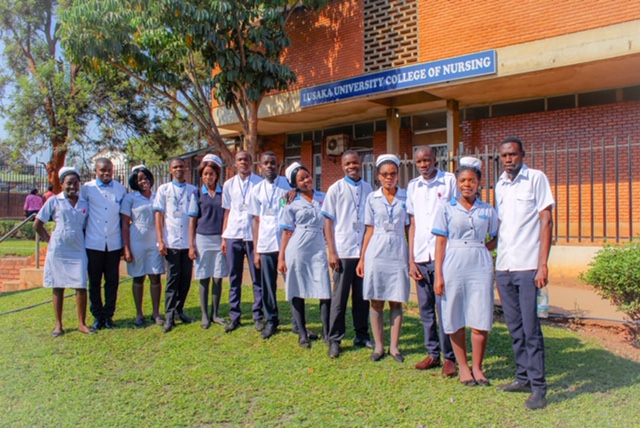Looking Back…Looking Forward: the impact of COVID-19
4 June 2020

The Birmingham City University – Lusaka College of Nursing and Midwifery Partnership has been working to improve standards of critical care in Zambia for over 5 years. This blog reflects on the history of the partnership and how the Health Worker Action Fund will assist the partnership in responding to the challenge of COVID-19.
The origins of critical care are linked to the Polio outbreak in 1952, and Covid-19 has been described as our generation’s polio, and also as with polio, the essential role of healthcare workers globally has been recognised. Our Health Partnership started over five years ago and has grown in strength in terms of activities and achievements, with all partners seeing each other as our ‘all weather friends’. We started with humble beginnings with a THET funded scoping exercise with a view to building the capacity of critical care nursing. This is a relatively new specialism of nursing with its potential not fully recognised, but one where in Zambia, the nurses carry immense responsibility. In Zambia, critical care medicine is not recognised as a specialism, in consequence, with limited doctors or few dedicated doctors, critical care nurses are having to undertake extended and essential roles to sustain and maintain acute sector healthcare services.
When we left our partners in March, we were all celebrating the successful validation of the first Zambian Bachelor of Science in Critical Care and the completion of a national workforce review of trauma, emergency and critical care services. None of us imagined that within such a short space of time, the world would have totally changed. Both countries and all partners have been under immense pressure since the Covid-19 pandemic. We wondered how it would impact on our Health Partnership – would our links survive with all our other competing priorities and pressures taking over? A risk facing health projects and partnerships involves protecting the ‘work done’ and preventing the ‘work being undone’, while ensuring our partnership survives. This pandemic has arguably been the strongest and most difficult test of our partnership.
A significant strength of our Health Partnership has been the extensive links we have in both Zambia and the UK, from strategic level to the frontline staff. In Zambia, our main partners the Lusaka College of Nursing and the Zambian Ministry of Health. In the UK, the main partner – Birmingham City University – has co-ordinated placements from NHS volunteers over several years. This has provided a rich pool of nurse educators and those from practice to support activities. Recognising these strengths we were able to use this to our advantage and when we applied to THET’s Health Worker Action Fund (HWAF), we were able to recognise the immense resources and links we had.
Over the years, our Health Partnership has created a community of practice between nurses with different cultural and professional backgrounds and experiences from all levels of the healthcare system, from strategic leaders to frontline nurses. This has given us a deep understanding of critical care, emergency and general nursing across Zambia. This has also allowed us to understand healthcare provision across the country and helped provide context.
The story of epidemics is the story of inequalities. In both Zambia and the UK, priorities have been diverted from other health priorities to focus on the Covid-19 response. While this is essential, the long term effects on the healthcare system need to be recognised. Our HWAF-funded project aims to build resilience within the healthcare workforce now and in the future. Working with our main partners, the Lusaka College of Nursing and Midwifery, we acknowledge and respect the reality that students (pre-registration and those completing specialist courses) are the future of any healthcare system and the staff teaching them will influence generations.
As healthcare systems are so stretched, Birmingham City University has called on NHS volunteers who have worked in Zambia with us previously, from NHS Trusts across England, to help deliver this project. This shared working will maximise the effectiveness by not being reliant on the few. In addition, many of the lessons we learnt while working in Zambia have helped us to respond to our own situation. This is true shared working, and the shared learning will help develop both of our healthcare systems.
We have seen that beyond the chaos and the uncertain future, behind the buildings and the beds, in between the staff and the patients, hidden from open sight, lie so many stories of courage and endurance waiting to be told. The HWAF will allow our Health Partnership to evolve in a new direction, into other areas of nursing, and the HWAF grant will help us to move together into the new phase, stronger, more resilient, able to share our stories and to work to shape a new positive future.
Chris Carter
Senior Lecturer, Faculty of Health, Education and Life Sciences, Birmingham City University, UK
Matron for Critical Care, University Hospital Lewisham, Lewisham & Greenwich NHS Trust, London, UK
Priscar Sakala Mukonka
Head, Lusaka College of Nursing and Midwifery, University Teaching Hospital, Lusaka, Zambia
Prof Joy Notter
Professor of Community Healthcare Studies, Faculty of Health, Education and Life Sciences, Birmingham City University, UK

Through the HWAF, the BCU-LUCON team are working to develop a context specific COVID-19 training package for healthcare workers at the Lusaka College of Nursing and Midwifery and the University Teaching Hospitals.
Using a Train the Trainer approach, the package will cover a range of topics, including:
- Myth-busting
- Infection Prevention & Control
- Nursing care
- Wellbeing and psychological first aid

"Beyond the chaos and the uncertain future, behind the buildings and the beds, in between the staff and the patients, hidden from open sight, lie so many stories of courage and endurance waiting to be told."
- BCU-LUCON Partnership Team


